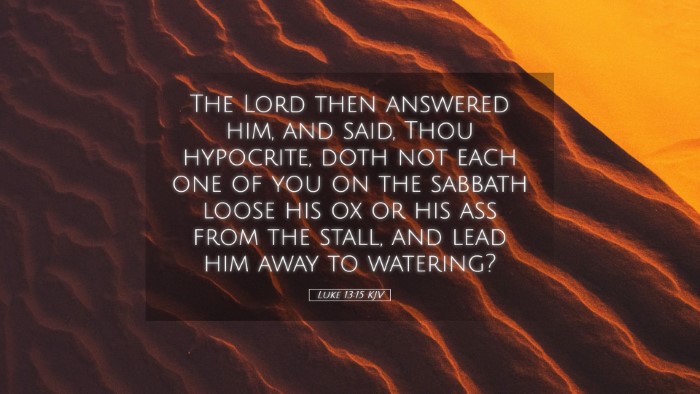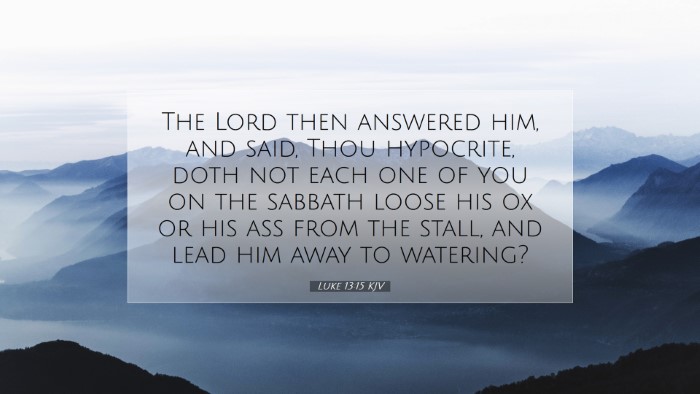Commentary on Luke 13:15
“But the Lord answered him and said, ‘Hypocrite! Does not each one of you on the Sabbath loose his ox or his donkey from the stall and lead it away to water it?’”
Introduction
This verse marks a vital part of Luke’s narrative emphasizing the authority of Jesus in the realm of Jewish Law and practices. This confrontation unfolds during Jesus’ ministry, particularly against the backdrop of healing on the Sabbath, showcasing the tension between divine compassion and religious legalism.
Contextual Analysis
Matthew Henry notes the socio-religious environment of the time, where the Sabbath was laden with numerous regulations and prohibitions. Pharisaical interpretations often overshadowed the essence of the Sabbath, turning it into a burden rather than a blessing. Jesus’ challenge to the ruler of the synagogue not only reveals hypocrisy but also invites an examination of one’s values in light of divine priorities.
Understanding ‘Hypocrite’
The term ‘hypocrite’ used by Jesus is significant. Albert Barnes elaborates on this, suggesting that those who profess to serve the Lord while disregarding His compassion and mercy are inconsistent in their beliefs and actions. This rebuke calls for self-examination among the religious leaders, urging them to reflect on their definitions of righteousness and service.
Realities of Human Need
In verse 15, Jesus points out the practical inconsistency in their application of the Law. Adam Clarke observes that even the strictest application of rabbinic law acknowledged the necessity of caring for animals on the Sabbath. This principle highlights the underlying need to prioritize human (and animal) welfare which supersedes rigid observance of the Sabbath.
- Compassion over Legalism: Jesus emphasizes that acts of kindness and mercy should not be suspended for the sake of adherence to laws.
- Service of Others: Actions taken to improve the quality of life for others are in keeping with the heart of the Sabbath law.
The Nature of True Worship
Henry further articulates that true worship and adherence to God’s statutes cannot be divorced from humanity’s needs. When Jesus highlights that the ruler’s ox and donkey receive necessary attention on the Sabbath, He illustrates that all creation deserves care and that worship should have a relational component—one that embodies love and grace. The Sabbath was made for man, not man for the Sabbath (Mark 2:27).
Broader Implications
This encounter serves as a microcosm of the broader Gospel message where Jesus prioritizes mercy over sacrifice (Matthew 9:13). The statement urges us not only to reflect on our actions but also to analyze our motivations and the integrity of our faith. Barnes notes that ritualistic practices devoid of love fail to resonate with the heart of God.
- Challenge Legalistic Attitudes: Believers are encouraged to challenge any legalistic tendencies that may emerge within their communities.
- Promote Grace-filled Living: The call for compassion in our dealings with others must be front and center within Christian ethics.
Conclusion
In summation, Luke 13:15 encapsulates Jesus’ radical understanding of the Sabbath against the rigid applications upheld by the religious leaders. It stands as a compelling reminder to pastors, students, theologians, and scholars that at the heart of Christian faith lies an unwavering commitment to mercy, compassion, and the welfare of others. In our interpretations and teachings, may we always prioritize these divine values, ensuring that we do not fall into hypocritical worship that elevates adherence over the essence of God’s heart.


